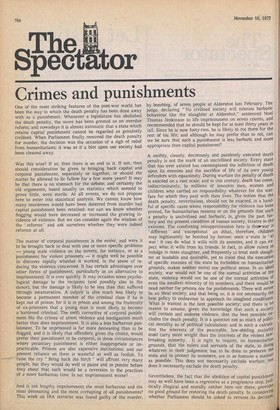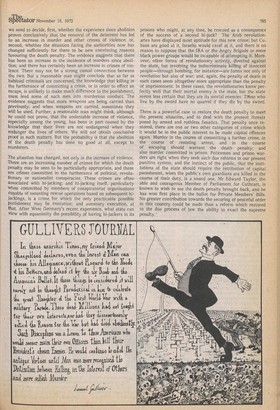Crimes and punishments
One of the most striking features of the post-war world has been the way in which the death penalty has been done away with as a punishment. Whenever a legislature has abolished the death penalty, the move has been greeted as on overdue reform; and nowadays it is almost axiomatic that a state which retains capital punishment cannot be regarded as genuinely civilised. When Parliament finally removed the death penalty for murder, the decision was the occasion of a sigh of relief from humanitarians; it was as if a blot upon our society had been cleaned away.
Was this wise? If so, then there is an end to it. If not, then should consideration be given to bringing back capital and corporal punishment, separately or together, or should the , matter be allowed toile fallow for a few more years? It may be that there is no stomach for the debate; and certainly the old arguments, based usually on statistics which seemed to prove little, were sterile. At all events, we do not propose here to enter into statistical analysis. We cannot know how many murderers would have been deterred from murder had capital punishment been retained; nor can we know whether flogging would have decreased or increased the growing incidence of violence. But we can consider again the wisdom of the ' reforms ' and ask ourselves whether they were indeed reforms at all.
The matter of corporal punishment is the easier, and were it to be brought back to deal with one or more specific problems — young male violence on the streets, for instance, or as a punishment for violent prisoners — it might well be possible to discover rapidly whether it worked, in the sen§e of reducing the violence concerned. It has certain advantages over other forms of punishment, particularly as an alternative to imprisonment. It is over quickly. It may occasion some psychological damage to the recipient (and possibly also to the donor), but the damage is likely to be less than that suffered through incarceration. A culprit is also much less likely to become a permanent member of the criminal class if he is kept out of prison; for it is in prison and among the fraternity of ex-prisoners that a young man is most likely to become a hardened criminal. The swift corrective of corporal punishment fits the crimes of street violence and hooliganism much better than does imprisonment. It is also a less barbarous punishment. To be imprisoned is far more demeaning than to be flogged, and it is likely that offenders, given the choice, would prefer their punishment to be corporal; in those circumstances where pecuniary punishment is either inappropriate or impracticable. Pris'ons are also expensive •institutions; and our present reliance on them is wasteful as well as foolish. To raise the cry "Bring back the birch" will affront very Many people, but they would do well to pause and to ponder before they shout that such would be a reversion to the practices of a more barbarous time. Is not imprisonment worse?
And is not lengthy imprisonment the most barbarous and the most demeaning and the most corrupting of all punishments? This week an IRA terrorist was found guilty of the murder, by bombing, of seven people at Aldershot last February. The judge, declaring "No civilised society will tolerate barbaric behaviour like the slaughter at Aldershot," sentenced Noel Thomas Jenkinson to life imprisonment on seven counts, and recommended that he should be kept for at least thirty years in jail. Since he is now forty-two, he is likely to rot there for the rest of his life; and although he may prefer thus to rot, can we be sure that such a punishment is less barbaric and more appropriate than capital punishment?
A swiftly, cleanly, decorously and painlessly executed death penalty is not the mark of an uncivilised society. Every state that has ever existed has contemplated the infliction of death upon its enemies and the sacrifice of life of its own young defenders with equanimity. During warfare the penalty of death is exacted on a vast scale; and in this century, death has come, indiscriminately, to millions of innocent men, women and children who carried no responsibility whatever for the warfare for which they paid with their lives. The notion that the death penalty, nevertheless, should not be exacted, in a handful of specific cases where responsibility for violence has been proved, for humanitarian reasons or on the grounds that such a penalty is uncivilised and barbaric, is, given the past history and the present conidtion of human society, bizarre in the extreme. The comforting misapprehension here is thatrwar is ' different ' and 'exceptional' an dthat, therefore, children may legitimately be bombed by heroes: once a•state is 'at war' it can do what it wills with its enemies, and it can expect what it wills from its friends. In fact, to allow rulers t° indulge in mass slaughter, and frequently to treat such slaughter as laudable and desirable, yet to insist that the execution of specific enemies of the state be forbidden on humanitarian grounds, makes neither moral nor political sense. In an ideal society, war would not be one of the normal activities of the state, violence would not be one of the normal activities of even the smallest minority of its members, and there would be need neither for prisons nor for punishments. There will neVer be an ideal society, and that being so, it is not necessarily the best policy to endeavour to approach its imagined conditions. What is wanted is the best possible society; and there is n° reason to assume, given the knowledge that such a societY will contain and endorse violence, that the best possible eXcludes the death penalty. It is a question not so much of political morality as of political calculation; and in such a calcula' tion the interests. of the -peaceable, law-abiding majoritY must carry more weight than the interests of the viOlent lavP breaking minority. It is right to require, on humanitarian grounds, that the rulers and servants of the state, in doing whatever in their judgement has to be done to preserve the state and to protect its members, act in as humane a manner as possible. This does not necessarily exclude warfare; Or does it necessarily exclude the death penalty.
Nevertheless, the fact that the abolition of capital punishment may as well have been a regressive as a progressive step, Pnli' tically illogical and morally neither here nor there, provides no good ground for restoring the death penalty. In considering Whether Parliament should be asked to reverse its decision, we need to decide, first, whether the experience since abolition proves conclusively that the removal of the deterrent has led to an increase in murder and other crimes of violence; or, second, whether the situation facing the authorities now has hanged sufficiently for there to be new convincing reasons favouring the death penalty. The evidence suggests that there has been an increase in the incidence of murders since abolition; and there has certainly been an increase in crimes of violence. There may not be a strong casual connection .between the two. But a reasonable man might conclude that as far as habitual criminals are concerned, the knowledge that killing in the furtherance of committing a crime, or in order to effect an escape, is unlikely to make much difference to the punishment, must lead some of such men into murderous conduct. 'The evidence suggests that more weapons are being carried than previously; and when weapons are carried, sometimes they Will be Used. Further, a reasonable man might think, although he could not prove, that the undeniable increase of violence, especially among the young, has been in part caused by the knowledge that their lives are not endangered when they endanger the lives of others. We will not obtain conclusive proof in such matters. But the probability is that the abolition of the death penalty has done no good at all, except to murderers.
The situation has changed, not only in the increase of violence. There are an increasing number of crimes for which the death Penalty may be seen to be particularly appropriate, and these are crimes committed in the furtherance of political, revolutionary or nationalist conspiracies. These crimes are often associated with hi-jacking; and hi-jacking itself, particularly when cOmmitted by members of conspiratorial organisations capable of mounting rescue operations based on subsequent hijackings, is a crime for which the only practicable possible Punishment may be execution; and summary execution, at that. After West Germany's recent experience, what state can view with equanimity the possibility of having hijackers in its prisons who might, at any time, be rescued as a consequence of the success of a second hi-jack? The Arab revolutionaries have displayed most aptitude for this new crime; but Cubans are good at it, Israelis would Excel at it, and there is no reason to suppose that the IRA or the Angry Brigade or some black power groups would be incapable of attempting it. Moreover, other forms of revolutionary activity, directed against the state, but involving the indiscriminate killing of innocent people—through bombing, for instance—are forms not only of revolution but also of war; and, again, the penalty of death in such cases seem altogether more appropriate than the penalty of imprisonment. In these cases, the revolutionaries know perfectly well that their mortal enemy is the state, but the state seems less certain that they are its mortal enemies. Those who live by the sword have no quarrel if they die by the sword.
There is a powerful case to restore the death penalty to meet the present situation, and to deal with the present threats posed by armed and ruthless fanatics. That penalty once restored, there are one or two other categories of crime which it would be in the public interest to be made capital offences again. Murder in the course of committing a further crime, in the course of resisting arrest, and in the course of escaping should warrant the death penalty; and also murder committed in prison. Policemen and prison warders are right when they seek such due reforms in our present punitive system; and the instinct of the public, that the institutions of the state should require the retribution of capital punishment, when the public's own guardians are killed in the course of their duty, is a ,sound one. Mr Edward Taylor, the able and courageous Member of Parliament for Cathcart, is known to wish to see the death penalty brought back, and he has won first place in the ballot for Private Members' Bills. No greater contribution towards the securing of peaceful order in this country could be made than a reform which restored to the due process of law the ability to exact the supreme penalty.'



















































 Previous page
Previous page